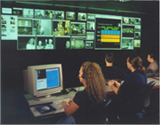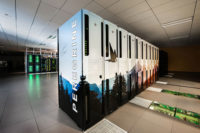
Access Grid 3 software uses open-source standards and Internet technology to create a collaborative environment in which users can see and hear each other as they navigate the space. According to Thomas Uram, one of the key developers of the software, “The central goal of the Access Grid is to establish an environment for cooperative work between remote participants and their digital media, a situation that is essential to address in a world where more people from more places are working together.”
The system is built on a paradigm of virtual meeting rooms, or “Virtual Venues.” Upon entering a Venue, one can participate in a number of activities as if all users were in the same room together. The software is designed to provide a natural feel, where users can see and hear one another, with video projected on a large display wall.
More than just videoconferencing, the Access Grid enables participants to share and interact with files and applications. The open nature of the Access Grid software has attracted thousands of users from around the world and has encouraged numerous commercial and research institutions to extend the software for their purposes.
Though competitive systems have videoconferencing capabilities, the Access Grid is the first of its kind to offer a free, extensible open-source collaborative environment. Further, the system is scalable, in that the number of video streams sent and displayed is limited only by the number of available machines and network bandwidth.
With the Access Grid, remote collaborators can see and talk with each other and share materials, while avoiding unnecessary travel.
Access Grid 3 is available for download from the project Website, www.accessgrid.org. Supported platforms include Windows, Linux, and OSX.
Publication date:10/22/2007








